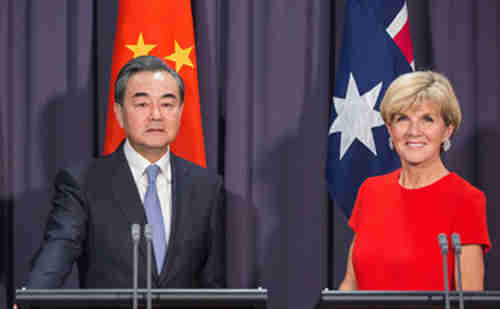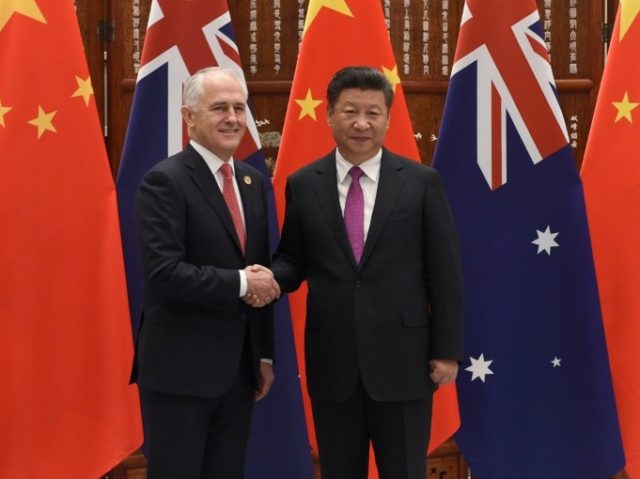This morning’s key headlines from GenerationalDynamics.com
- Australia-China relations in crisis after revelation of Chinese bribery scandal
- Andrew Hastie’s explosive speech identifying Chau Chak-wing
- China blames Australia and threatens retaliation
Australia-China relations in crisis after revelation of Chinese bribery scandal

China’s foreign minister Wang Yi and Australia’s foreign minister Julie Bishop, on 7-Feb-2017
China is expressing renewed fury at Australian politicians after an explosive speech delivered to Parliament on Tuesday evening accused a prominent wealthy Australian politician of Chinese descent of an explosive bribery scheme.
The politician, Dr. Chau Chak-wing, is accused of being linked to the Chinese Communist Party (CCP) and of being a previously unnamed co-conspirator in a 2013 case where United Nations General Assembly president John Ashe was bribed with $200,000, along with tens of thousands of dollars in custom suits and clothes, to obtain UN backing for a number of multi-billion-dollar Chinese infrastructure projects in including Antigua and Barbuda, and other countries. Before becoming president of the General Assembly, Ashe was the ambassador to the UN for Antigua and Barbuda.
Ashe died before he could be convicted, but two co-conspirators were convicted by the US Dept. of Justice in New York in 2016:
Shiwei Yan, a/k/a “Sheri Yan,” the co-founder and former chief executive officer of the Global Sustainability Foundation, was sentenced in Manhattan federal court today to 20 months in prison for paying more than $800,000 in bribes to John W. Ashe (“Ashe”), the late former Permanent Representative of Antigua and Barbuda (“Antigua”) to the United Nations (“UN”) and 68th President of the UN General Assembly. Yan pled guilty in January 2016, and was sentenced today by U.S. District Judge Vernon S. Broderick.
U.S. Attorney Bharara stated: “As she admitted in court at her guilty plea, Shiwei Yan bribed the President of the UN General Assembly with hundreds of thousands of dollars to further private business interests. For her role in corrupting the United Nations, Yan will serve time in a federal prison.”
Another co-conspirator, Heidi Hong Piao, a/k/a “Heidi Park”, was convicted at the same time. The complaint also named a third co-conspirator, a “Chinese real estate developer” only identified as “CC-3”:
YAN and Piao also arranged for ASHE to be paid $200,000 in exchange for attending a private conference in China in Ashe’s official capacity, hosted by a Chinese real estate developer identified as “CC-3” in the Complaint.
During the scheme, YAN and Piao also arranged for Ashe to receive tens of thousands of dollars in custom suits and clothes.
In imposing sentence, Judge Broderick said, “To those bent on perverting decision-making” through bribery, “this simply will not be tolerated…there are consequences to these actions.”
The mysterious CC-3 was not identified by name but was known to the FBI. Recently, politicians in Australia’s government attended a confidential briefing by the FBI, and during the course of that briefing, CC-3 was identified as wealthy Australian politician Dr. Chau Chak-wing. South China Morning Post and Sydney Morning Herald (7-Oct-2015) and US Dept. of Justice (29-Jul-2016) and Business Insider
Andrew Hastie’s explosive speech identifying Chau Chak-wing
On Tuesday evening, a Liberal backbencher Andrew Hastie gave a speech identifying Chau, thus breaking the confidential agreement, taking advantage of Australia’s Constitution that allows a parliamentarian to say anything in parliament and not be prosecuted.
Today I raise a matter before the House that is of great importance to the Australian people. It is a matter that poses a threat to our democratic tradition, particularly the freedom of the press, and our national sovereignty. I refer to the threat of foreign interference in our political institutions.
…
We live in a rapidly changing world. We are watching the rise of authoritarian states. Those states are conducting foreign interference operations across Western democracies. In Australia it is clear that the Chinese Communist Party is working to covertly interfere with our media and universities and also to influence our political processes and public debates.
…
The central pillar of the government’s counter foreign interference strategy is sunlight. That’s why we’re seeking to introduce a new Foreign Influence Transparency Scheme. The principle is simple. If a person or entity engages with the Australian political landscape on behalf of a foreign state or principal, they must register accordingly. This will give the Australian public and decision-makers proper visibility when foreign states or individuals may be seeking to influence Australian’s political processes and public debates.
…
For reasons that are best undisclosed, the United States government did not seek to charge CC-3 for his involvement in the bribery of John Ashe. The bribery does, however, raise the question: what were the objectives of CC-3 in securing Ashe’s attendance at the conference?
Hastie explained that CC-3 had a leadership role in China’s United Front. In previous articles, I have described China’s “United Front Work Department” as something that China’s president Xi Jinping has said was China’s “Magic Weapon.”
Officially, the United Front focuses on building support for the Communist Party in China, but it has become a coercive propaganda tool targeting Chinese globally, especially in Australia, New Zealand, the U.S., and Canada, but in other countries as well. The agency particularly surveils and targets Chinese students and Chinese students abroad and in foreign universities to adopt language that favors pro-Beijing policies, such as delegitimizing Taiwan, and opposes Western ideals and values, such as liberal democracy, Christianity, or Falun Gong.
Andrew Hastie described CC-3’s involvement in the United Front in Tuesday evening’s speech, using CC-3’s Mandarin name Zhou Zerong:
The United Front is a platform of the Chinese Communist Party that is tasked with influence operations for the People’s Republic of China. It aims to influence the choices, direction and loyalties of its targets, with a particular focus overseas on foreign political and business elites. The primary objective of the United Front is to shape thinking and attitudes in a way that is favorable to China. Mao Zedong, for good reasons, described the United Front as one of the three magic weapons of the Chinese Communist Party. Zhou, or CC-3, was no stranger to the United Front. He had assumed leadership of an organization intimately involved with it. In the final paragraph of the cable, Goldberg wrote that the Guangdong Overseas Chinese Businessmen’s Association was essentially a creature of the Chinese Communist Party’s United Front program.
Hastie concluded his speech by naming Chau specifically:
As chair of the Parliamentary Joint Committee on Intelligence and Security I led a delegation to the United States last month to discuss our espionage and foreign interference legislation with US counterparts. During discussions with United States authorities I confirmed the long-suspected identity of CC-3. It is now my duty to inform the House and the Australian people that CC-3 is Dr Chau Chak Wing, the same man who co-conspired to bribe the president of the United Nations General Assembly, John Ashe, the same man with extensive contacts in the Chinese Communist Party, including the United Front. I share it with the House because I believe it to be in the national interest. My duty first and foremost is to the Australian people and to the preservation of the ideals and democratic traditions of our Commonwealth. That tradition includes a free press. I thank the House.
Australian Broadcasting and Australian Parliament and Daily Mail (London)
China blames Australia and threatens retaliation
Andrew Hastie’s explosive revelations were not previously revealed to Prime Minister Malcolm Turnbull, who has recently been on a charm offensive to improve relations with China.
Relations between China and Australia have been increasingly tense for a number of reasons. One is that China’s illegal militarization of the South China Sea is seen as a military and commercial threat to Australia. Furthermore, as we reported in February, a new book extensively documents China’s infiltration into Australia’s organizations. The new charges that prominent Australian politician Chau Chak-wing participated in a Chinese Communist Party bribery operation, and had a leadership position in the powerful United Front espionage organization, only add to the concerns that many Australians have about the infiltration of China into Australia.
The increasing hostility of Australian politicians to China has brought some sharp responses from China itself. In Wednesday’s press conference by China’s foreign ministry, the spokesman said:
The China-Australia relations have recently encountered difficulties, which leads to problems in our cooperation in some areas, and that is something China does not wish to see. … [The] Australian side must first of all address its problem of perception, put China’s development in a positive perspective and truly take China’s development as a positive factor, instead of looking China through tinted glasses. Once the problem of perception addressed, the necessary conditions for the true improvement and sound and steady development of China-Australia relations will be created.
China’s state media is taking the editorial position that Australia should be punished for its “arrogant” attitude:
Sino-Australia relations have remained on a steady downward slope since last year due to distorted reporting on behalf of Australian media and remarks made by Australian politicians on China’s alleged interference and infiltration in Australian internal affairs.
Such remarks have not only created obstacles in the development of bilateral relations between the two countries, but also have had a negative impact on Chinese living in Australia. Australian officials recently made unfriendly remarks toward China, actively hurling accusations.
…
It is high time China demonstrated how it sticks to its principles in regard to its relations with Australia, so as to make Australia pay for its arrogant attitude toward China over the past two years.
…
China has been very friendly toward Australia, but their arrogant attitudes in return over the past two years have become a virtual example of what it means to “bite the hand that feeds.”
Australia’s image among Chinese people has grown increasingly negative due to its warped accusations hurled at China. China does not need to spend time and effort seeking out revenge against Australia.
The cooling of bilateral relations between the two may last for a while, perhaps a few years or even longer. That would be a good lesson for Australia to learn, while also setting a precedent for other nations to follow in that there are no benefits for any country that chooses to take provocative measures against China.
It seems that relations between Australia and China will not improve much in the months to come, and in fact will probably deteriorate further. Business Insider and China Foreign Ministry and Global Times (China) and New Daily (Australia)
Related Articles
- New book documents extensive Chinese infiltration into Australia’s organizations (26-Feb-2018)
- Concerns grow over China’s covert infiltration into New Zealand’s government (16-Feb-2018)
- China-Australia relations plummet over China’s illegal militarization of South China Sea (16-Dec-2017)
- Australian MP Clive Palmer shocks country with anti-China rant (21-Aug-2014)
KEYS: Generational Dynamics, Australia, China, Chau Chak-wing, CC-3, Zhou Zerong, John Ashe, Antigua and Barbuda, UN General Assembly, Andrew Hastie, Malcolm Turnbull, China, Xi Jinping, Magic Weapons, United Front Work Department
Permanent web link to this article
Receive daily World View columns by e-mail

COMMENTS
Please let us know if you're having issues with commenting.